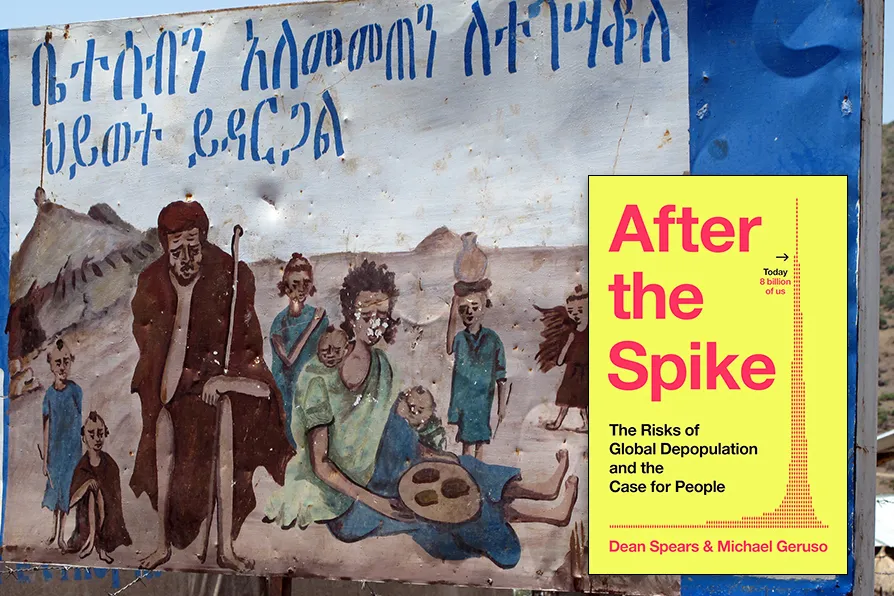New releases from Bill Callahan, The Delines, and Beck
JOHN GREEN asks how can we take decisive action on population levels with a world leader who is a destructive ignoramus

 A family planning placard seen near Lalibela, Ethiopia. It shows some negative effects of having too many children (Poverty, malnourishment, illnesses, insufficient education, deforestation, desertification). [Pic: Maurice Chedel/CC]
A family planning placard seen near Lalibela, Ethiopia. It shows some negative effects of having too many children (Poverty, malnourishment, illnesses, insufficient education, deforestation, desertification). [Pic: Maurice Chedel/CC]
After the Spike — The Risk of Global Depopulation and the Case for People
Dean Spears and Michael Geruso, Bodley Head, £22
THE debate around the implications of human population growth on the planet has raged for some time. Most experts do, however, accept that we live on a finite planet and there is a limit as to the number of human beings the planet can support. These two authors, however, differ from those who argue that curbing population growth is essential if we are to save the planet’s resources, by arguing that we are already seeing a slow down of such growth.
They are both economists and argue with ample data and statistics that world population growth will reach a spike in the next few years, after which population will decrease until it either diminishes, or reaches a stabilisation point of replacement only. In many countries of the world today, fertility rates are at two or below which means that the global population is already in decline. Population is growing not because of increased fertility rates but falling death rates.
The authors make somewhat heavy weather in arguing their case, as if the more data and graphs present, the more likely we will be convinced of their arguments. The average reader is likely to become impatient with the detailed arguments and pros and cons of various theories. Does it really need a whole book to make this point?
They largely ignore the issues, of what an ideal population size would be, but also the question of what quality of life do we aspire to. Certainly, if everyone wished to live like US citizens — ignoring its industrialised agriculture, and with a proliferation of junk food, a private healthcare system and poor welfare etc. — the planet would become unsustainable very quickly even for a very much reduced global population.
Population ethics — such as can or should we control populations and how — is touched on but only skirted, as are the potentially devastating consequences of global warming.
Their arguments are very much US-centred, mixing family anecdotes with hard scientific research. They appear to view the US as the leading nation in terms of progress and values. They ignore examples from the socialist countries or even social democratic ones.
They also avoid political questions and argue blandly for “people” to take this or that action, totally ignoring the fact that in capitalist societies we are very much beholden to outdated political systems and to profit-hungry trans-global monopolies that frustrate genuine and vital action by the people at every stage.
And there is not a single mention of Trump in their book, which rather pinpoints the central weakness of their thesis. How can we take decisive action with a world leader who is a head-banging, destructive ignoramus and narcissist?
Vital action on population, global warming and sustainable growth can only be taken by consensus by an organisation such as the United Nations, but much strengthened and with powerful lobbying groups excluded. But the authors appear to believe that such action can be taken alone by environmental agencies, governmental think tanks and social institutions, as if quality of life depends on policy makers’ decisions at this level.
They make bland statements like: “Over the next few decades, while the world urgently needs to address many environmental challenges, the size of the global population is a thing we cannot change.” They also argue counterintuitively that “Our lifestyles today are more sustainable than previous generations” and that we “can make a fair, stabilised future. Humanity could choose a future that’s good, freer, and fair to women and men and that also has an average birth rate of two.”
“There is no inescapable dilemma,” they aver, but “humanity” doesn’t make such decisions, political forces do and they are very much in the hands of mega corporations, intent on profit and nothing else. The authors ignore this contradiction.

JOHN GREEN applauds an excellent and accessible demonstration that the capitalist economy is the biggest threat to our existence

JOHN GREEN wades through a pessimistic prophesy that does not consider the need for radical change in political and social structures

ALAN SIMPSON warns of a dystopian crossroads where Trump’s wrecking ball meets AI-driven alienation, and argues only a Green New Deal can repair our fractured society before techno-feudalism consumes us all










